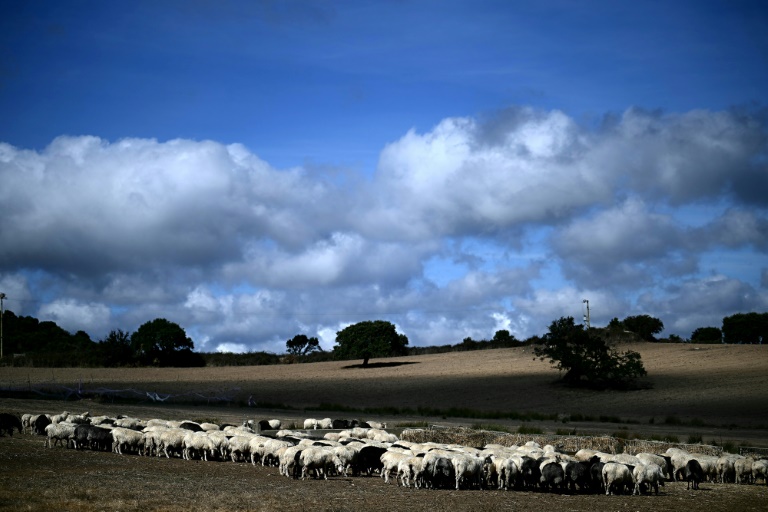The sheep huddle together, bleed from the nose, abort lambs or choke on saliva as they succumb to bluetongue, a virus sweeping through the flocks on the Italian island of Sardinia.
So far this year, some 20,000 sheep have died on the island, which is home to almost half of Italy’s flock and plays an important role in the production of famous Italian cheeses such as Pecorino.
It’s another blow to farmers in a region already ravaged by a drought worsened by human-induced climate change – which experts say is also fueling the spread of bluetongue and longer outbreaks.
“The virus struck about two and a half months earlier than normal,” 39-year-old farmer Michela Dessi told AFP as she scanned her flock for panting or limping sheep in her fields in Arbus in western Sardinia.
Bluetongue poses no risk to humans, but in animals it causes swollen heads, high fever, mouth ulcers, difficulty swallowing and breathing, and can turn the tongue of an infected animal blue.
It is transmitted between animals by biting mosquitoes.
Although cattle, goats and deer can also get it, sheep are the most affected, according to the World Organization for Animal Health (WOAH).
Infected and pregnant ewes abort or their lambs are born deformed, and survivors may lose their wool.
Sunken sides are a sign that the ewes are carrying dead fetuses. The sick animals have difficulty expelling them.
– Virus spikes –
The infection rate on Dessi’s farm is about 60 percent this year, and some 30 percent of her sheep have been aborted.
About 50 of her 650 sheep have died – and in some ways she says it was “terrible to see”.
With high fevers, “they refuse food and water and some suffocate or drown in their own saliva,” she said, adding that it is illegal to euthanize them.
Nearly 3,000 outbreaks have been recorded in Sardinia so far this year, compared to 371 last year – and there is no end in sight.
Bluetongue used to peak in Sardinia in August, but in recent years this has only been the case in November, according to the region’s Veterinary Research Institute (IZS).
“Climatic conditions have a major impact on mosquito populations,” the animal health department of the United Nations Food and Agriculture Organization in Rome told AFP.
They influence “their biting behavior and the speed of virus development, with climate change likely to drive virus expansion… and contribute to larger outbreaks.”
Cases have been reported in other European countries this year, from neighboring France to Portugal, Spain, Germany, Belgium and the Netherlands.
Bluetongue has been present in Sardinia since 2000, but Italian agricultural lobby Coldiretti says authorities are too slow to vaccinate the island’s herds every year.
The costs of failing to contain this are high.
A study by the University of Bologna last year found that the 2017 outbreak, which killed 34,500 sheep, cost an estimated €30 million.
That included the damage suffered by farms – deaths, reduced milk yields, infertility, abortions – costs to animal health authorities and subsidies paid by the region to affected farms.
– Mass graves –
“The first outbreaks occur every year in the same risk areas,” which means that highly targeted measures could theoretically prevent outbreaks, says Stefano Cappai of the IZS research institute.
There are three variants on the island this year, two of which can be vaccinated, with mortality rates twice as high among unvaccinated sheep.
The herds should be vaccinated in March or April, Cappai said, but the vaccines were not delivered by the region until mid-June this year.
At that point, the virus began to spread uncontrollably.
Even if the vaccines had become available sooner, some farmers are afraid to use them.
Others vaccinate only part of their herd, meaning they fail to achieve herd immunity, Cappai said.
And some farmers – like Dessi – vaccinated her flock, just so the sheep could catch the variant for which there is no vaccine yet.
Battista Cualbu, head of Coldiretti in Sardinia, who also has an outbreak on his farm, said vaccines are not enough and authorities need to disinfect areas and provide mosquito repellents.
“It would certainly save public money as the region has to pay compensation for dead livestock (and) lost income,” he said, including less milk sold and fewer lambs for the slaughterhouse.
Compensation is set at 150 euros per sheep killed by bluetongue – an amount Coldiretti is reluctant to increase, although the region has failed to pay in the past three years, Dessi said.
As temperatures drop, cases are expected to decline, but Dessi said the end is still weeks away.
“I have already dug three mass graves and I fear the worst is yet to come,” she said.
ide/ar/gil

